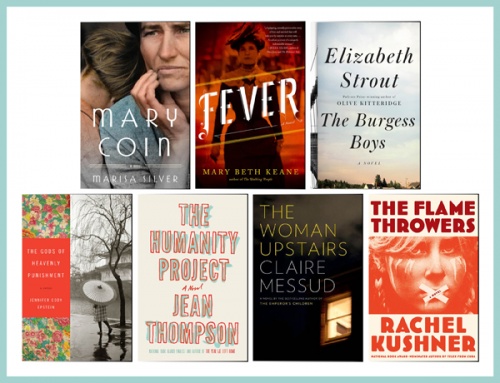By Megan O'Grady, Vogue
From historical provocateurs to contemporary artists, spring fiction celebrates fierce women.

Photo: (from left to right, top to bottom) Courtesy of Blue Rider Press, Simon & Schuster, Random House, W.W. Norton Press, Penguin Group, Random House and Simon and Schuster.
"Enchantment means to want something and also to know, somewhere inside yourself, not an obvious place, that you aren't going to get it," says "Reno," the 22-year-old aspiring artist and speed-obsessed motorcycle enthusiast of Rachel Kushner's stunning second novel, The Flamethrowers (Scribner), which conjures 1970s New York's gritty art world. Determined to make her name, Reno falls in with a group of conceptual artists and filmmakers, each out to break down the boundaries between performance and reality -- but it's not until she pushes a few limits of her own that she understands what's really at stake. (See an expanded review, and an interview with the author, in Vogue's April issue.) Inspired by Dorothea Lange's iconic Depression-era photograph, Migrant Mother, Nipomo, California, Marisa Silver's ingenious Mary Coin (Blue Rider) captures the points of view of photographer and subject, both of whom find their lives shadowed by the image's monumental fame. And an outrageous act of artistic appropriation fuels Claire Messud's The Woman Upstairs (Knopf), in which a New England schoolteacher and self-described good girl finds her creative energies -- as well as a shimmering, long-dormant anger -- awakened by a friendship with a student's mother, a glamorous Italian artist.
Medical history's ultimate bad girl was Mary Mallon, the Irish cook who refused to concede that she might be a typhoid carrier, in spite of the trail of death that followed her. A fascinating turn of the last century-set medical cat-and-mouse story, Mary Beth Keane's Fever (Scribner) summons sympathy for the contrary personality at its center, a self-made immigrant grappling with work and love, dignity and denial. A young pianist comes of age in World War II-era Tokyo and meets an American GI in Jennifer Cody Epstein's The Gods of Heavenly Punishment (Norton), which showcases war's bitter ironies -- a son tasked with bombing the buildings his architect father designed, say -- as well as its romantic serendipities. In contemporary Maine, a teenage boy's racially-charged prank prompts his New York attorney uncles to converge on the town of their youth in Elizabeth Strout's latest, The Burgess Boys (Random House), but it's the sister who never left who understands alienation best. And a hoydenish teenage girl -- a witness to the school-shooting death of the stepsister she despised -- moves in with her estranged hippie father in Jean Thompson's The Humanity Project (Blue Rider), an odd-couple pairing that deepens into a social novel with a strong satiric vein. If sixties ideals don't quite translate in more cynical times, fathers and daughters -- and the desire for something better -- are eternal.
